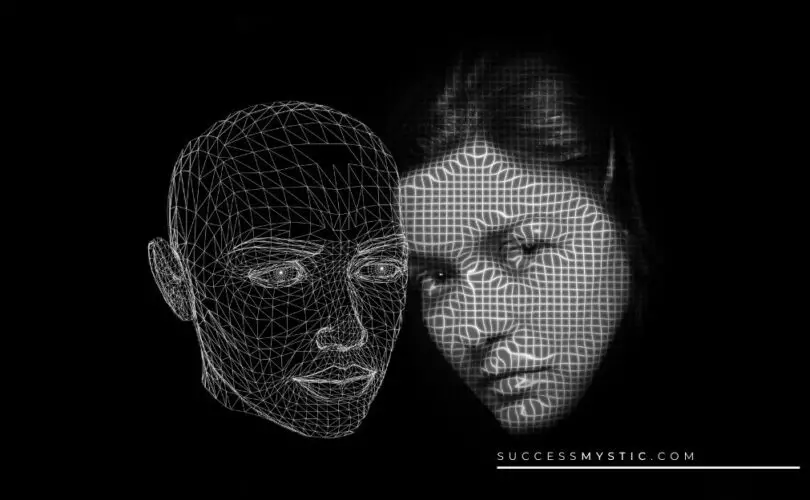What Is Self-Deception
The act of lying. To yourself.
You have probably noticed this type of behavior unfold in the people around you. A situation where someone believes something about themselves, even though they must know it isn’t real. It’s not true. They just believe that it is.
This isn’t the same as faking it till you make it. It certainly isn’t the same as straight-up lying or even exaggeration. Those cases involve someone being fully aware of the deception involved. Self-deception runs much deeper. It’s far more complicated.
Examples Of Self-Deception
Ryan is a really nice guy. Everyone in his life enjoys spending time with him until he gets his hands on alcohol. He’s soft-spoken and pleasant, but as soon as he drinks alcohol his mood changes. His mood turns further when someone suggests that he might have a drinking problem. The evidence of his problem is everywhere.
He secretly buys an extra bottle and stashes it in his nightstand. When it’s his turn to go to the bar he downs several drinks before returning with everyone’s round. He hides his empty bottles around the house until he can dump them without his roommate’s knowledge. He’s been sent home from work several times for being hungover or for getting caught drinking on the job. He’s lying to himself. It is only self-deception is he hasn’t accepted he has a problem. He hasn’t so it’s self-deception.
Nathaniel is a stock trader. In his role as a stock trader, he has access to information about different firms. He uses that information to buy and sell and as a result, he does exceptionally well. He has a leg up, it’s cheating, it’s illegal, but if he judges his ability based on this performance then he will likely self-deceive himself into believing that he will get high returns from investing in firms he might not know as much about.
He’s deceiving himself about his ability. He’s deceiving himself about his performance being a result of this ability. He doesn’t have insider information in subsequent trades. As his portfolio grows and shifts and changes, he gets a more balanced view of his ability. Will Nathaniel adjust his view and correct his self-deceptive beliefs? It’s hard to tell.
Max is a deeply empathetic woman. She cares profoundly, not just for the people in her life, but also for the people she encounters throughout her day, and the people who are suffering all over the world. That has informed a lot of her behavior. She goes out of her way to help others at every opportunity. She also has a deep hatred of her mother and she cannot admit it despite the signs. When her mother is mentioned, she pulls a face and angers quickly.
There is a good reason for her to react this way, her mother did not do a good job of looking out for her growing up. She abandoned her and though she tries to make up for it now, Max has yet to let go of the anger she’s been holding onto for decades. She’s so empathetic that she simply cannot admit that she’s still angry. She can’t admit it because the very thought of it fills her with shame and guilt.
In a slightly different situation, Gloria is the mother of one child. When her son Martin was arrested, she was stunned. It didn’t matter how much evidence of his crimes came out during his trial, Gloria refused to believe what the prosecution said. All of the evidence was there. It was incontrovertible. The jury reached their decision in record time. There was photographic evidence found in his possession.
There was video evidence of the steps he took leading up to the crime. There was video evidence of him fleeing the scene of the crime. To admit that Martin would do such a thing would mean that Gloria was letting go of her entire reason for being. Martin was her pride and joy and all of that would be destroyed if she believed what the evidence said. She simply could not bring herself to believe it.
Self-deception is complicated. It’s almost as though our unconscious mind is desperate to protect us from the truth because it would be earth-shattering. The more you analyze cases of self-deception, the more complex it appears. Explaining it means you must acknowledge the presence and participation of the unconscious mind. Only in this part of your mind can all of these emotional conflicts influence our behavior while remaining inaccessible to the individual. The unconscious knows the truth, but it’s our conscious self that refuses to accept the reality.
So, when you boil it down to its bare bones, self-deception runs much deeper than being mistaken about yourself. There may be many aspects of life that you are thinking in error about. However, that does not necessarily mean you have self-deceived. Just because you’re wrong about something in your life doesn’t mean the self-deceptive process has been involved.
For example, Jared was adopted. No one ever told him he was adopted, everyone around him chose to keep that a secret from him. He hasn’t fallen prey to self-deception because he never knew the truth to withhold it from himself.
Or, for years Cherith bragged about her genius-level IQ. She wasn’t deceiving herself when she said this, she just hadn’t yet found out that the IQ test she took to discover this wasn’t a legitimate one. So, when Cherith went to take an official IQ test and found she was only above average… it would have only been self-deception if she rejected that as false and continued believing she was a genius.
The History Of Self-Deception
Sigmund Freud is an inevitable part of the conversation surrounding self-deception due to the involvement of the unconscious mind. Self-deception isn’t viewed as a traditional defense mechanism. Rather, it is viewed as a necessary part of all human defense mechanisms. For any type of defense mechanism to work there has to be some presence of self-deception. When you project or repress, you must be both hyperaware and unaware of disturbing information.
The theory does not believe in the individual’s ability to recognize self-deception (ref.). You can recognize it in others, others can recognize it in you, but they don’t believe someone can recognize it in themselves. It sounds like a harsh conclusion and in truth, it probably is too harsh. At some point, you may be able to recognize your self-deceptive behavior. Often time and space from the issue are what help us recognize how we have been deceiving ourselves.
Jean-Paul Sartre attacked Freud after he first wrote on the subject of self-deception. He dismissed the idea as impossible because how could you possibly know something while not knowing it at the very same time?
It’s a powerful criticism because how does a person avoid a thought without recognizing that that thought is present in the first place?
Let’s break it down with an analogy.
Your neighbor is your nemesis. They might not know that they are your nemesis, but you know it. You cannot avoid them unless you remain vigilant about potential appearances by this nemesis neighbor.
Yet, you also want to avoid this upsetting knowledge and that means you have to constantly turn your mind in the other direction. How can you successfully achieve this task if you aren’t aware of the potential threat?
Freud heard Jean-Paul Sartre’s critique and he dismissed it. Anyone that possessed a true understanding of the unconscious mind would recognize that self-deception is possible. As it happens, Freud’s belief has been repeatedly supported by cognitive psychology developments making Sartre incredibly wrong. Unfortunately for Freud, neither are still around for him to gloat about it.
So, what has cognitive psychology taught us about the unconscious? Well, we know that a lot of processes are unconscious. We also know that our cognitive setup makes room for multiple versions of the same piece of information.
You can store contradictory information in different parts of the brain. We also know that we process emotional stimulus more quickly than the actual content. This is how polygraphs work. The body responds emotionally to a work and the machine graphs that emotional impact before the word or statement is even understood. It’s why polygraphs are notoriously inaccurate and cannot be used in a court of law.
With solid evidence of these mental processes, the idea of self-deception moves from unbelieved to quite feasible.
Two different systems of the brain process incoming information. One system is cognitive. It deals with the stimulus’s informational value. The other system is emotional. It deals with the emotional response and because it kicks into operation first it allows your mind to erect pre-emptive obstacles.
The Evolutionary Basis For Self-Deception
Our knowledge of self-deception stretches back millennia. As soon as human beings started documenting history and writing, the subject of self-deception was broached. Psychologists have long suspected that there is an evolutionary basis for self-deception.
This is to say that humans self-deceive because it is built-in. Psychological tendencies give us the survival advantage and people who did not self-deceive were not as adept at surviving as those who did self-deceive.
How could this be? How could this irrational behavior be considered adaptive? According to anthropologist Robert Trivers, our motives would be less effective if we had complete awareness of them (ref.). If you believe you can deal with absolutely any threat you are presented with, then your courage in the face of danger will grow.
Being overconfident can help you be the person you already believe yourself to be. If you are wrong? There are going to be negative consequences, whether it’s a threat to your safety or a threat to your career or well-being. If you are right? You get exactly what you want and the self-deception you engaged in helped you further yourself.
The Evidence Supporting Self-Deception
So far, we have highlighted plenty of evidence supporting the existence of self-deception. The bulk of evidence supporting self-deception comes from the clinical experience of psychiatrists and psychologists. Clinicians report many instances of patients clearly engaged in self-deception and the unhealthy consequences that came as a result.
There is far less experimental evidence supporting self-deception. To be clear, there are just two studies that describe and demonstrate self-deception. Granted, all it takes is one valid presentation to show that humans self-deceive. The issue is that it is difficult to carry out these types of demonstrations, even in a controlled lab study. You can decide for yourself whether either study convinces you. Let’s take a look.
The first study was published in the Journal of Personality and Social Psychology, authored by psychologists Ruben Gur and Harold Sackeim (ref.). Their study began with the premise that people do not typically like to hear their own voices.
They simply do not like the sound of their voice, especially when they hear it back after it is recorded. The main task asked that participants picked out their voices from a series of recorded voices. They were to simply say not me or me when they heard each voice. Participants were connected to a polygraph to measure their emotional response.
So, there are two different pieces of information involved here. There is an emotional response thanks to the polygraph and there is the participant’s oral response.
The subject hears their own voice and their emotional response is clear, but their oral response doesn’t align with it. They hear their voice, the polygraph recognizes it, but the participant denied it. The person knows something without knowing it. The person does not know their own beliefs.
In the next stage, Gur and Sackeim took steps to damage the subject’s self-esteem. This increased the likelihood of false denials. The more the participants were motivated to avoid confrontation with themselves the more likely they were to make a false denial.
The psychologists believe their study shows that participants believe while also disbelieving at the exact same time. Their awareness was motivated by reducing self-esteem. This demonstration of self-deception is all the proof necessary to show that self-deception exists.
That was the first study, the second was carried out by psychologists Amos Tversky and George Quattrone. It was also published in the Journal of Personality and Social Psychology (ref.). In this 1984 study, they relied on a cold pressor test. Participants were asked to keep one of their hands plunged into a bucket of incredibly cold water. They were asked to keep it submerged for as long as they could possibly stand it.
Before the study, some participants were told that pain from cold water suggests a weak cardiovascular system that results in a shorter lifespan and heart attacks at an early age. The participants who were given this information before the test claimed the task was less painful. They were also more likely to keep their hands submerged for longer. They were trying to convince themselves that they did not possess that cardiovascular problem. This was a case of self-deception. They couldn’t acknowledge to the researchers that they were in pain, but they couldn’t admit it to themselves either.
Do these studies convince you? If anything, what it should prove is that it’s difficult to prove self-deception. A convincing experiment or demonstration has to show that a participant believes something while disbelieving it at the very same time.
So, it shouldn’t be surprising that there are only two studies that claim to have successfully demonstrated self-deception. The majority of writings regarding self-deception were published by philosophers. Psychologists have to collect data to support the claim and philosophers don’t. A philosopher needs only to develop a logical argument. They need only to develop a persuasive argument.
The Value Of Self-Deception
We have discussed several examples thus far. Those examples all suggest that self-deception is deeply rooted in the psychological process. In every case, someone has the necessary information to draw an accurate conclusion but their emotional side reacts first and prevents them from doing so.
There are loads of everyday illusions that feel mildly flavored with self-deception. They just aren’t as dramatic.
For example, have you ever (or do you know someone who has) set your watch ahead of time to make sure you’re punctual? You set it ahead five, maybe even ten or fifteen minutes. How can that work when you know you have changed the time on your watch? You’re too smart to be fooled by that. Yet, there are plenty of people who do this and say it helps them with their punctuality problems. You know it’s not an accurate telling of the time, but you choose to accept that it is true because it benefits you.
Procrastination is another excellent example. It doesn’t matter how many times your procrastination burns you, you continue to procrastinate. It is the most damaging and useless strategy you have ever attempted.
You tell yourself the stress and pressure of doing things last minute fuels you and improves your performance. It doesn’t. You come up with a series of excuses and rationalizations that allow you to sleep in, make a phone call, browse the web or do literally anything other than what you are supposed to do.
While they have hints of self-deception, it isn’t fair or right to label them as such. It would absolutely be a stretch to say these are true examples of self-deception. The same way flavored sparkling waters merely echo the fruit they claim to be flavored with. They are in the ballpark, but they are not playing for the same team. It would be more accurate to put the two examples above under the umbrella of strategic coping mechanisms. Self-deception is reserved for situations where a strong psychological force is preventing someone from recognizing or acknowledging a threatening self-truth.
So, what is the value of self-deception? Why is it important? The concept is fundamental to our need to balance or trade two fundamental motivations. We want accurate information about the complexity of the world, but we also want to defend against any information that shakes the foundation we have built our lives on.
How quickly does self-deception decay? How much evidence is necessary for someone like Nathaniel, who used insider information to get ahead, to accept that it wasn’t his exceptional ability that caused his success?
How much reality will it take for the truth to sink in? Once someone realizes the pitfalls and force of self-deception, are they less likely to fall into the trap of self-deception?
It’s hard to know because we are all different. Someone like Nathaniel is clearly a cheater. His successful performance is a result of that cheating, but Nathaniel wouldn’t see himself as a cheater. He sees himself as successful because of his excellent abilities. Someone like Nathaniel might struggle to recognize his propensity for self-deception.
The Benefits Of Self-Deception
There are many benefits of self-deception, many of which are detailed in Joseph T. Hallinan’s book Kidding Ourselves: The Hidden Power of Self-Deception (ref.). Recent research suggests that people gain something from their self-deceptive beliefs. By viewing their future as their preferred future (ref.). A great example of this is optimists. Optimists tend to work harder because they see what results are possible and then they strive for those results (ref.).
There are also a series of psychological benefits that come with self-deception. In one of the studies (ref.) participants were provided an opportunity to cheat on their test. The answer key was available. As a result of this opportunity, they began over-predicting their performance on the coming tests.
They didn’t attribute that first result to access to the answers, they deceived themselves to believe that regardless of the answer key they would perform well.
Final Thoughts
While research shows us that self-deception is real, we need more research. Without additional research, we will never know two of the most important factors in self-deception, which are when it occurs and how we can stop it. While there are benefits, as noted above, there are also negative consequences when we engage in regular self-deception and have a distorted view of self as a result of this deception.
While research thus far suggests that self-deception may occur during both the retrieval and encoding process we don’t know for sure. The study where participants performed well because the answers were at the bottom of their test sheet?
Those participants believed it was down to their ability. At what point did the self-deception begin? Was it when their eyes flickered down to the answers? Or did the awareness of the answers linger for a time before that information dissipated and was replaced by their conviction that their abilities were so great?
We also need research into how we can prevent self-deception. There are likely several factors that will help prevent self-deception. A particularly promising path may revolve around the decay of self-deception. As in, how long does it take for that self-deception to decay when faced with the truth? In the cheating test study, the majority of participants had to take several tests before they were able to recognize that the first result was not due to their ability. Eventually, they stopped believing that they were so much better than they were in reality.
In terms of what, what is it that separates self-deception from episodes or events? And the why? What functions does self-deception serve? Both are questions that pique the curiosity of scholars from all kinds of disciplines. The recent research is only beginning to shed light on self-deception. The trick is ensuring we don’t fall into the trap of self-deception when thinking we have a full understanding of psychology.
It isn’t odd for humans to view themselves through rose-tinted glasses. We do that to ourselves, we do it to our loved ones, and our lives. It’s natural to try to self-enhance. We focus on positive attributes to make ourselves look better, feel better, and do better.
Most of the empirical studies that involved self-evaluation sought to explore why we are motivated to overestimate our abilities. It is so powerful a motivation that the majority of participants were happy to ignore negative information to maintain the positive self-image they had built of themselves. If they didn’t ignore it, they found a way to rationalize it. That motivated reasoning is what helps them confirm their positive attitudes and beliefs about themselves. We can be quite creative, impressively so, as we attempt to justify questionable decisions and behavior.
While there isn’t a firm answer on how to prevent self-deception, you can take steps to manage your habit of deceiving yourself. You now know that it’s a result of your emotions responding before your mind processes the actual content. You might be able to get yourself out of the trap of self-deception by taking time to act or respond in the face of receiving information.
I’ll take it back to Nathaniel the cheating stock trader. He enjoyed the thrill of making money, the thrill of winning. He convinced himself that his abilities were incredible. Had he taken some time to process his success, by putting some space between himself and that high he may have been able to recognize that he got ahead because of the insider information he had.
If Gloria had been able to separate her emotions and love for Martin from the situation to look at the evidence against him objectively, she may have been able to reconcile the two. She could still have loved and supported the son she knew while accepting that he had done some awful things to other people.
What have you been deceiving yourself about and what are you going to do about it?







